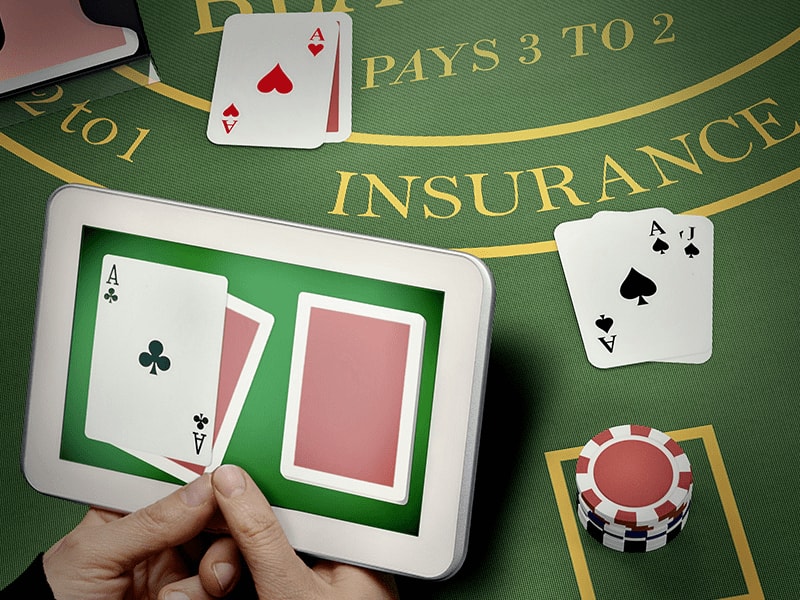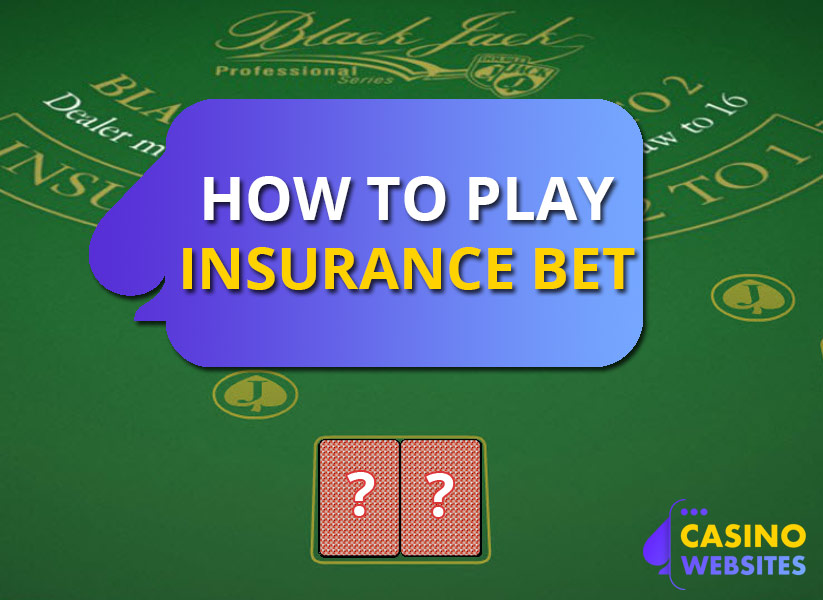Is Insurance In Blackjack Worth It
Blackjack Insurance – A Bad Bet One seemingly good bet to beginning blackjack players is taking insurance. And a major reason why beginning players are fooled into thinking insurance is a good idea is because dealers ask players beforehand if they want insurance when the opportunity arises.
- Let’s take a closer look at what insurance in blackjack is, how is it identical to the blackjack even-money payout, and why you should avoid both of them if you are a basic strategy player. How Blackjack Insurance Works. Blackjack players are offered insurance whenever the dealer’s exposed card is an Ace.
- Ask a fellow blackjack player whether insurance is worth it, and you’ll receive plenty of different answers since insurance is a controversial subject. We’ll give you all the information you need to reach a conclusion. What is Insurance in Blackjack. You won’t always have the option to take an insurance bet.
I’ve written a few articles in the past that included advice that said you should never take insurance when you play blackjack. I stand by this advice because, for over 90% of the players who read my articles, the advice is 100% correct.
But I also need to present the other side of the argument to give you a complete understanding of insurance. The truth is that insurance is the correct play in a few specific situations. Most of these situations only become apparent to professional card counters, and because counting pros spend most of their time beating the casinos and not reading my articles, my advice of never taking insurance is correct for everyone else.
So why am I writing an article about taking insurance?
As you’re getting ready to learn, there are a few situations while playing blackjack when clearly it seems that taking insurance is a good bet. The odds are good that these situations are going to surprise you because they’re not why most players take insurance.
The Argument Against Insurance
The reason why taking insurance is a bad decision most of the time can be explained using simple math. But, as you’re going to see in the next section, this same simple math is used to show in a few situations that insurance is a good bet.
When the dealer has an ace, he or she offers insurance to the payers at the table. Insurance costs half of your original wager and pays 2 to 1 when the dealer has a natural blackjack. The only way the dealer has a natural blackjack is when his or her down card is worth 10 points.
The odds of the face down card being worth 10 points are 9 to 4 against. This is a percentage chance of 30.77% that the dealer has a blackjack. The reason why the odds are 9 to 4 is because of the 13 total card ranks, four of them are worth 10 points, and the other nine aren’t. The four 10-point value ranks are the face cards and the 10s.
When you compare 9 to 4 against the payout of 2 to 1, the casino has an edge. For the bet to be fair, the chances of the dealer having a blackjack need to be the same as the payout. The payout of 2 to 1 means that the percentage chance of the dealer having a blackjack needs to be 33.33%.
In any situation where the chance the dealer has a blackjack is over 33.33%, the insurance wager is a good bet.
The problem is that most of the time, the dealer doesn’t have a 33.33% or higher chance to have a blackjack. This goes back to how you compute the dealer’s percentage, or odds, based on the normal makeup of a deck of cards.
Determining the odds or percentages based on a normal distribution of cards in the deck sounds correct, but it assumes you don’t know the value of any cards. This is the safe way to do it, especially in a shoe game because a single card doesn’t change the odds or percentages much.

But what happens if you take the knowledge of cards played and remaining available in the deck or shoe into account?


Is there a way to use this information to determine when taking insurance is a good bet?
When You Should Take Insurance
Now that you understand how the math behind the insurance bet works, let’s look at a specific example where the bet changes from bad to good.
You’re playing in a single deck blackjack game.
- On the first round of hands, you see the value of 14 cards. Only one of them is worth 10 points, so the remaining cards have 15 cards valued at 10. With 14 cards played, the deck has a total of 38 cards.
- The second round of hands is dealt, and the dealer has an ace face up. You haven’t seen the value of the other player’s cards at this point, and you have a king in your hand. Now you’ve seen the values of 17 cards when you include the two in your hand and the dealer’s ace.
- The remaining unseen cards total 35 and 14 of them are worth 10 points. This means that the odds of the dealer having a 10-point value down card are 21 to 14 or 3 to 2 against. In other words, 40% of the time the dealer is going to have a natural blackjack.
A winning insurance wager pays 2 to 1, so the odds are better than that in this hand. The 2 to 1 payout means that the chance of a dealer blackjack needs to be at least 33.3%, and in this example, the chance is 40%.
While this example is an extreme one to show when insurance is a good bet, you can also learn something from it. Now that you know that the chances of the dealer having a natural blackjack need to be 33.3% or higher, you can use this information in any single deck blackjack game. You can even use it in a double deck game if you do a good job of tracking cards.
This is much like card counting in that you don’t have to memorize every single card that’s been played. All you need to do is keep track of the ratio of total cards played to 10-point value cards. This even works in shoe games, but the truth is if you’re able to keep track of this ratio in shoe games, you should be counting cards.
How Important Is This Knowledge?
While it’s important to recognize and use every small advantage you can find, the truth is that the opportunity to take insurance with an edge is rare. If you play in single and double deck games often, it’s something that you should watch for.
But you should only concern yourself with profitable insurance opportunities after you do a few other things to lower the house edge. The first thing you should do is find blackjack games with good rules. The next thing every blackjack player should do is use basic strategy. It’s a waste of time and energy to worry about insurance before you do these two things.
Once you learn about the rules and learn how to use perfect strategy, then you can start looking for opportunities to take advantage of insurance. But even in this situation, I recommend looking for insurance opportunities as an introduction to learning more about counting cards.
When you start tracking card ratios, which is at the heart of determining when taking insurance is a good bet, you’re starting to use the same techniques card counters use. And the fact is that most popular card counting systems include a breakpoint where players start taking insurance.
If you’re looking for every possible edge at the blackjack table, understanding how insurance works and when you should take it is important. But if you don’t want to do the extra work, then stick with good rules and proper strategy. By declining insurance every time, you’re not going to make a mistake often. When you do, it’s only going to cost you a small amount over time.
It’s a much more costly mistake to take insurance when you shouldn’t than to miss an opportunity to take insurance every once in a while, when it’s the correct play.
Conclusion

Taking insurance at the blackjack table is a bad bet most of the time. If you’re a basic strategy player or a seat of your pants player and don’t count cards, your best play is to always decline blackjack insurance. But as you can see from the numbers included in this article, there are certain situations when insurance goes from a bad bet to a good one.
Once you master basic blackjack strategy, start looking for opportunities where insurance is a good bet. When you start recognizing these opportunities, it’s a good sign that you’re ready to investigate card counting. It’s a small step from understanding and using what you learned above to become a successful card counter.
Please enable JavaScript to view the comments powered by Disqus.Whether you’re playing live online blackjack or going down to your local casino, you’ll need to know the basics first. Get used to using every tool at your disposal if you truly want to win in blackjack. Today, we’ll be taking a look at one such tool – the bet insurance. This is a rather controversial topic for most blackjack fans – a lot of veterans consider it a trap for beginners. However, used wisely, it’s not without its advantages.
Still, let’s start at the very beginning by going through the rudiments.
What Is Bet Insurance in Blackjack?
Bet insurance in blackjack is a kind of side bet you make on the dealer getting a Blackjack. The only time you can make such a bet is if the dealer gets an Ace as their upcard. The idea is to prevent yourself from losing to a Blackjack, or at least to make the money back. That’s why it’s called insurance – you’re making a safety net against a sudden loss. However, if the dealer does not end up drawing Blackjack, you’ll lose the bet insurance. Generally, bet insurance costs half your original wager and pays out 2 to 1.
If it’s still not clear, we’ll use an example. Imagine that your initial draw adds up to 19 – a 9 and a Jack, for instance. That’s a pretty strong hand, but the dealer’s first card is an Ace. This gives them a solid chance of beating you with the coveted 21.
With most blackjack live tables, the dealer stands on a soft 17. As such, the biggest danger to your strong hand is a dealer Blackjack. You can put down insurance with a stake that’s half your initial wager. If you do and the dealer does get Blackjack, you lose the hand but win the insurance bet. Because of the standard 2:1 payout, you would break even instead of losing money.

Of course, if the dealer does not get Blackjack, you lose the insurance bet. However, you could still go on to win the hand. That’s why bet insurance is only really worth it if you get a hand that amounts to more than 17. Your profits would be smaller if you win, but at least you had the safety net.
When to Use Insurance Bets in Blackjack?
The first question most beginners ask is – is the insurance bet good? The short answer is no – in most cases, the insurance bet is not a good option to take. That is because the average odds on the dealer getting blackjack after an initial ace are 9/4, or around 30%. That means that the insurance bet odds would have to be closer to 3:1 to be worth it. The discrepancy is quite large, which makes insurance bets fairly low value.
That’s why we recommend most beginners stay away from insurance bets. Of course, advanced players may find some exceptions to the rule. You may find yourself in a game where the shoe has considerably more high-value cards than is usual. The more such cards there are left, the bigger the dealer’s chances of getting Blackjack are.
Is Insurance In Blackjack Worth It Now
Experienced card counters may find themselves in such a situation and be aware of it. In such specific cases, bet insurance can become a useful part of your blackjack strategy. However, most live online blackjack tables play with shoes of 6 or 8 decks. The number of high-value versus low-value cards would have to be seriously skewed to make bet insurance worth the wager. You can find more information in our basic guide to blackjack card counting.
Is Insurance In Blackjack Worth It Right Now
We hope this blackjack insurance bet strategy guide was useful. Good luck!